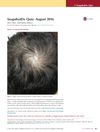 22 citations,
November 2011 in “Journal of Analytical Toxicology”
22 citations,
November 2011 in “Journal of Analytical Toxicology” Scientists have developed a new method to detect steroid abuse in athletes using cell-based tests, which could be the future of anti-doping methods.
 19 citations,
March 1998 in “Endocrinology”
19 citations,
March 1998 in “Endocrinology” Male rats have more somatostatin neurons than females due to testosterone converting to estrogen during early development.
 46 citations,
September 2010 in “Southern Medical Journal”
46 citations,
September 2010 in “Southern Medical Journal” Hair loss treatments include medications and new methods like low-level light therapy, which may work by boosting cell activity and blood flow.
 15 citations,
April 2008 in “Steroids”
15 citations,
April 2008 in “Steroids” The more lipophilic the progesterone derivative, the better it binds to androgen receptors and has antiandrogenic effects.
 7 citations,
January 2019 in “The Aging Male”
7 citations,
January 2019 in “The Aging Male” Post-finasteride syndrome's existence is uncertain; more research needed.
 5 citations,
May 2020 in “Dermatologic Therapy”
5 citations,
May 2020 in “Dermatologic Therapy” 5-alpha reductase inhibitors might worsen lung recovery in COVID-19 patients, suggesting a pause in their use.
 15 citations,
October 2010 in “Archives of Toxicology”
15 citations,
October 2010 in “Archives of Toxicology” A yeast-based test can detect the steroid methyltestosterone in urine longer than traditional methods.
 10 citations,
December 2017 in “Chemosphere”
10 citations,
December 2017 in “Chemosphere” Bisphenol-A (BPA) increases connections between brain cells and boosts their activity, but it blocks the effects of a male hormone on brain cell plasticity.
 January 2019 in “Springer eBooks”
January 2019 in “Springer eBooks” Acne can appear or persist in adulthood due to hormonal changes, external factors, or substance use, and requires appropriate treatment.
Avicennia Marina extract and avicequinone C can reduce hair loss hormone production and increase hair growth factors, suggesting they could be used to treat androgenic alopecia.
 138 citations,
July 2015 in “Clinical, Cosmetic and Investigational Dermatology”
138 citations,
July 2015 in “Clinical, Cosmetic and Investigational Dermatology” Eating less sugar, milk, and saturated fats and more vegetables and fish may help treat and prevent acne.
 58 citations,
January 2003 in “Thrombosis and Haemostasis”
58 citations,
January 2003 in “Thrombosis and Haemostasis” Testosterone may slow down wound healing and increase inflammation.
12 citations,
January 2018 in “Pharmacology & pharmacy” Pumpkin seed products may help improve prostate and bladder health by blocking certain enzymes and hormone receptors.
 4 citations,
August 2021 in “Biomedicine & Pharmacotherapy”
4 citations,
August 2021 in “Biomedicine & Pharmacotherapy” 5-alpha reductase inhibitors, like finasteride and dutasteride, may cause depression, but more research is needed to understand why.
Certain genetic variations are linked to hair loss in Mexican men.
 9 citations,
August 2013 in “Archives of Dermatological Research”
9 citations,
August 2013 in “Archives of Dermatological Research” A gene called BMAL1 plays a role in controlling hair growth.
 46 citations,
February 2016 in “Experimental Dermatology”
46 citations,
February 2016 in “Experimental Dermatology” Genes play a significant role in male-pattern baldness, and understanding them could lead to new treatments and insights into related health issues.
 27 citations,
November 2013 in “Journal of Dermatological Science”
27 citations,
November 2013 in “Journal of Dermatological Science” The conclusion is that androgenetic alopecia and senescent alopecia have unique gene changes, suggesting different causes and potential treatments for these hair loss types.
 June 2024 in “Research Square (Research Square)”
June 2024 in “Research Square (Research Square)” Young women in West Bengal, India, with PCOS often have estrogen resistance, leptin receptor issues, folate deficiency, T2DM, and acanthosis, commonly linked to obesity.
 6 citations,
January 2021 in “International Journal of Molecular Sciences”
6 citations,
January 2021 in “International Journal of Molecular Sciences” Finasteride-treated male rats' offspring had altered glucose metabolism, potentially increasing diabetes risk.
20 citations,
March 1975 in “Journal of steroid biochemistry/Journal of Steroid Biochemistry” The study concludes that a genetic mutation in TFM mice leads to reduced androgen receptor activity, affecting the body's response to male hormones.
 July 2016 in “Journal of Investigative Dermatology”
July 2016 in “Journal of Investigative Dermatology” Balding scalps show different gene expressions affecting hair growth compared to non-balding scalps.
39 citations,
February 2011 in “The Prostate/The prostate” Some men's prostate tissues have low enzyme levels due to genetic changes, possibly affecting treatment for prostate enlargement.
August 2023 in “Frontiers in Oncology” New drugs and therapies targeting specific pathways show promise in treating advanced prostate cancer.
 5 citations,
March 1985 in “Head & Neck Surgery”
5 citations,
March 1985 in “Head & Neck Surgery” Combining scalp reduction and hair transplants improves coverage and appearance for male baldness.
 23 citations,
March 2001 in “Clinics in Dermatology”
23 citations,
March 2001 in “Clinics in Dermatology” Hair restoration surgery techniques have evolved, with focus on patient selection and realistic goals, and future advancements may include cloning and gene therapy.
 4 citations,
June 2015 in “Journal of Genetics/Journal of genetics”
4 citations,
June 2015 in “Journal of Genetics/Journal of genetics” Genetic differences within ethnic groups may affect prostate cancer treatment effectiveness.
 4 citations,
September 2020 in “PeerJ”
4 citations,
September 2020 in “PeerJ” Platelet factor 4 slows down hair growth and could make hair loss treatments more effective if removed.
2 citations,
May 2019 in “Small ruminant research” Mutations in specific llama genes may affect fiber quality for textiles.
31 citations,
April 2015 in “Journal of steroid biochemistry and molecular biology/The Journal of steroid biochemistry and molecular biology” Androgens cause oil-producing skin cells with androgen receptors to mature and produce more oil.





















